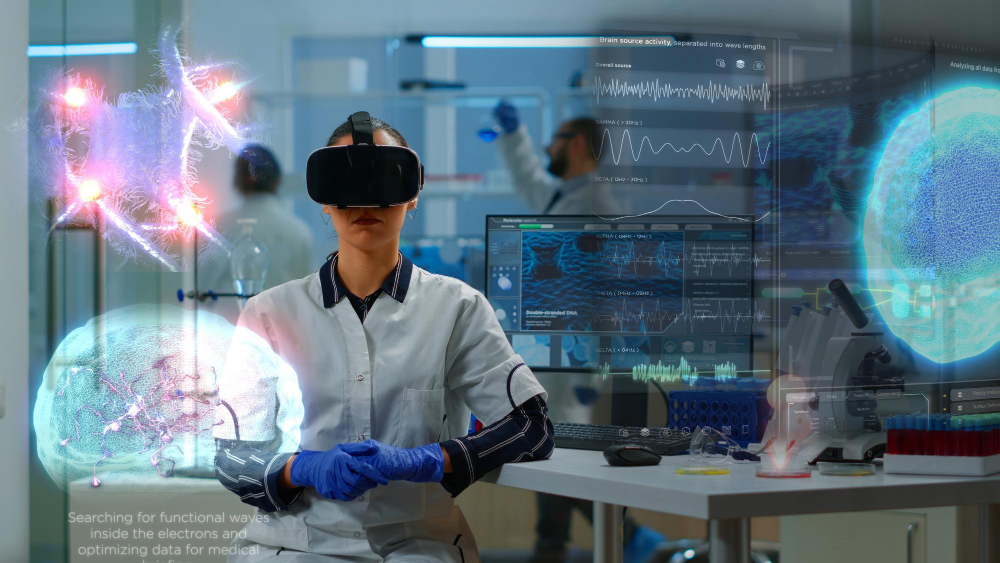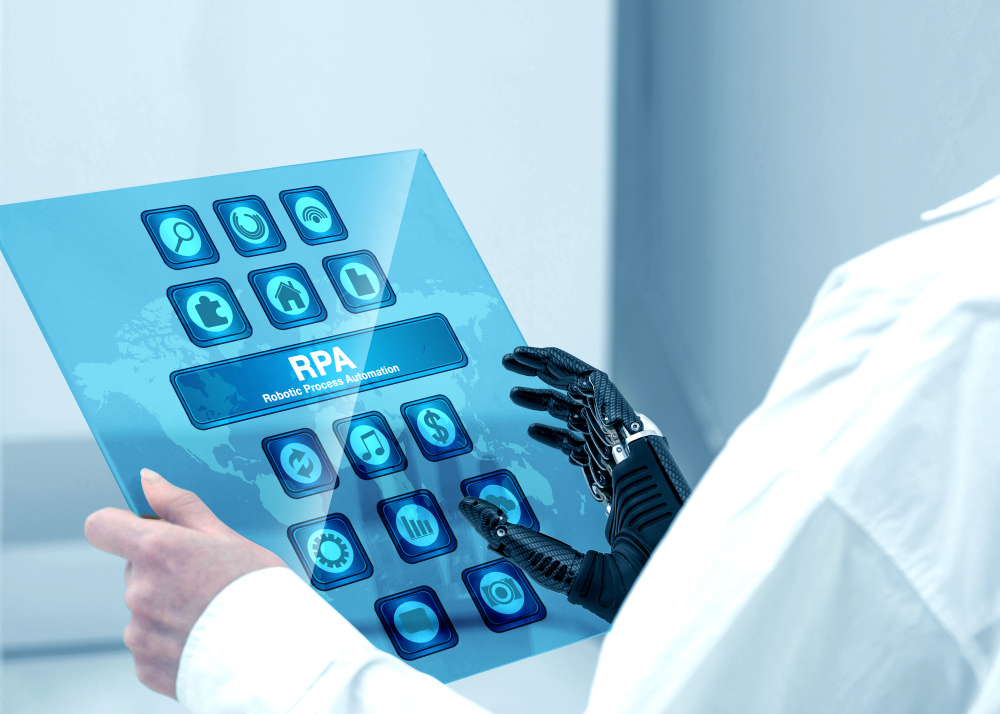
Revolutionizing Healthcare: 11 Ways AI in Pharma Industry Ignites Innovation
AI in Pharma Industry: The landscape of the pharmaceutical industry is experiencing an unprecedented transformation, and at the forefront of this revolution is the integration of Artificial Intelligence (AI). In this section, we embark on a journey to unravel the intricacies of AI’s role in the Pharma sector, offering readers a nuanced and comprehensive understanding of this groundbreaking synergy.
Artificial Intelligence, once confined to the realms of science fiction, has become an integral player in the pharmaceutical domain. At its core, AI refers to the simulation of human intelligence in machines, enabling them to perform tasks that traditionally required human intellect. In the context of the Pharma industry, this technological marvel is harnessed to analyze vast datasets, unravel complex biological patterns, and expedite drug discovery processes.

As we delve into the intricacies of AI’s application, envision a realm where algorithms sift through mountains of genetic information, identifying potential drug candidates with unparalleled precision. Gone are the days of solely relying on traditional methods; AI brings forth a new era of efficiency and efficacy in drug development.
Significance of AI Integration in Pharma
The significance of integrating AI into the pharmaceutical landscape cannot be overstated. It serves as a catalyst for innovation, driving the industry towards unprecedented advancements. Beyond the confines of laboratories, AI permeates every facet of pharmaceutical operations, from research and development to clinical trials and patient care.
Imagine a scenario where AI algorithms analyze patient data to tailor treatments specifically to individual genetic makeup, giving rise to the era of personalized medicine. This not only enhances treatment outcomes but also minimizes adverse effects, marking a paradigm shift in how we approach healthcare.
Moreover, AI streamlines and optimizes clinical trials, expediting the path from discovery to market. The ability to predict patient responses and identify potential challenges before they arise not only saves valuable time but also significantly reduces the financial burden associated with drug development.
The integration of AI in Pharma Industry is a game-changer, propelling the industry into a future where innovation is not just encouraged but intrinsic to its very fabric. As we navigate through this article, the layers of AI’s impact on drug discovery, personalized medicine, clinical trials, and beyond will unfold, offering a glimpse into the transformative power of this technology in shaping the future of healthcare.
Evolution of AI in Pharma Industry

A. Early Developments
The early chapters of AI in the pharmaceutical industry resemble a captivating narrative, where innovation and experimentation laid the foundation for a revolutionary partnership between technology and healthcare. In the nascent stages, researchers and scientists recognized the untapped potential of AI to address the industry’s inherent challenges.
Picture the first forays into AI-assisted drug discovery, where algorithms began deciphering the intricate language of molecular structures. These early systems, though rudimentary by today’s standards, marked a crucial leap forward. The ability to analyze massive datasets allowed researchers to explore novel avenues and identify potential drug candidates with unprecedented efficiency.
As we journey through the timeline of AI’s emergence in Pharma, envision the excitement and curiosity that surrounded these early developments. The scientific community, armed with newfound computational tools, started pushing the boundaries of what was deemed possible. It was a period of trial and error, laying the groundwork for the transformative strides that would follow.
B. Recent Advancements
Fast forward to the present, and the landscape of AI in the Pharma industry has undergone a metamorphosis. Recent advancements stand as a testament to the relentless pursuit of innovation, ushering in an era where AI is not just a tool but an indispensable partner in pharmaceutical endeavors.
Imagine advanced machine learning algorithms, finely tuned through years of refinement, seamlessly navigating the intricacies of genomic data. These algorithms can now predict potential drug interactions, anticipate adverse effects, and even identify promising drug combinations, exponentially accelerating the drug discovery process.
The integration of AI has not been limited to the confines of laboratories; it has permeated every aspect of pharmaceutical operations. In the realm of clinical trials, recent advancements in AI have streamlined protocols, optimizing patient recruitment, monitoring, and data analysis. Real-time insights empower researchers to adapt and refine their approaches, ensuring more efficient and successful trials.
Moreover, AI’s influence extends to personalized medicine, where recent breakthroughs have enabled tailoring treatments based on individual genetic profiles. The era of one-size-fits-all medication is fading, making way for precision medicine that considers the unique characteristics of each patient.
In this section, we unravel the tapestry of AI’s evolution in Pharma, from its tentative first steps to its current position as a driving force behind transformative breakthroughs. Join us as we explore the impact of recent advancements, painting a vivid picture of how AI is reshaping the future of healthcare and pharmaceutical innovation.
Key Applications of AI in Pharma Industry

A. Drug Discovery and Development
In the dynamic realm of pharmaceuticals, the process of discovering and developing new drugs has historically been intricate and time-consuming. However, with the advent of AI, a new chapter in drug discovery has unfolded. Imagine a virtual laboratory where AI algorithms tirelessly sift through vast datasets, unraveling the complexities of molecular structures and identifying potential drug candidates with unparalleled efficiency.
AI’s contribution to drug discovery doesn’t stop at data analysis. Picture a scenario where machine learning models, trained on historical drug development data, predict the success of new compounds, significantly reducing the hit-and-miss nature of traditional methods. This not only accelerates the discovery phase but also optimizes resource allocation, making the entire process more cost-effective.
B. Personalized Medicine
The concept of one-size-fits-all medications is evolving into a more personalized approach, thanks to the transformative power of AI. Personalized medicine harnesses the unique genetic makeup of individuals to tailor treatments that are more effective and carry fewer side effects.
Envision a world where AI algorithms analyze vast genomic datasets, identifying specific genetic markers that influence drug responses. This knowledge enables healthcare providers to prescribe medications customized to an individual’s genetic profile, optimizing therapeutic outcomes. The era of precision medicine, made possible by AI, heralds a paradigm shift towards more effective and targeted healthcare interventions.
C. Clinical Trials Optimization
Clinical trials, crucial for validating the safety and efficacy of new drugs, have traditionally been resource-intensive and time-consuming. Enter AI, revolutionizing the landscape by optimizing every facet of the clinical trial process.
Visualize an AI-powered system that streamlines patient recruitment, identifying suitable candidates based on specific criteria and accelerating the enrollment process. During trials, AI continuously monitors patient data, providing real-time insights into drug responses and potential side effects. This not only ensures participant safety but also allows for swift adaptations to trial protocols, making the entire process more agile and responsive.
D. Predictive Analytics in Disease Management
The integration of AI in disease management heralds a new era of proactive and personalized healthcare. Picture a scenario where predictive analytics, fueled by AI, analyze patient data to forecast disease progression and identify potential complications.
AI algorithms can sift through vast amounts of clinical data, identifying patterns that may elude human analysis. This capability enables early detection of diseases, allowing for timely interventions and personalized treatment plans. The result is a healthcare system that moves from reactive to proactive, focusing on prevention and early intervention with the ultimate goal of improving patient outcomes.
As we navigate through these key applications of AI in the pharmaceutical industry, the transformative impact becomes evident. AI isn’t merely a tool; it’s a catalyst for innovation, ushering in a future where drug discovery is more efficient, medicine is tailored to individual needs, clinical trials are optimized, and disease management is characterized by proactive, data-driven strategies. Join us on this journey into the heart of AI’s applications in Pharma, where groundbreaking advancements are shaping the future of healthcare.
Challenges and Opportunities

The integration of Artificial Intelligence (AI) into the pharmaceutical sector brings forth a myriad of challenges and opportunities, shaping the landscape of healthcare innovation. In this section, we delve into the ethical considerations, regulatory hurdles, and the vast potential benefits that accompany the symbiotic relationship between AI and the Pharma industry.
A. Ethical Considerations
As AI permeates the various facets of the pharmaceutical domain, ethical considerations become paramount. Envision a scenario where algorithms influence critical decisions in patient care, drug development, and treatment plans. The ethical conundrum lies in ensuring that AI applications prioritize patient welfare, adhere to privacy standards, and avoid biases that may disproportionately impact certain demographics.
Navigating the ethical dimensions of AI involves thoughtful considerations of transparency, accountability, and the implications of relying on algorithms for crucial healthcare decisions. Striking the right balance between technological advancements and ethical principles is imperative to ensure that AI serves as a force for good in the pharmaceutical landscape.
B. Regulatory Hurdles
The integration of AI in Pharma Industry is not without its regulatory challenges. Picture a dynamic environment where technological advancements outpace regulatory frameworks. This discrepancy raises concerns about patient safety, data security, and the standardization of AI applications within the industry.
Regulatory bodies face the daunting task of adapting existing frameworks to accommodate the rapid evolution of AI. Developing guidelines that ensure the reliability, accuracy, and ethical use of AI in drug development and patient care is a delicate process. Addressing these regulatory hurdles is essential to foster an environment where AI can be harnessed to its full potential while maintaining the highest standards of safety and compliance.
C. Potential Benefits and Opportunities
Amidst the challenges, the integration of AI into the Pharma industry unveils a panorama of potential benefits and opportunities. Picture a landscape where AI-driven drug discovery shortens development timelines, bringing life-saving medications to market faster. Personalized medicine, made possible by AI, opens avenues for tailoring treatments to individual genetic profiles, maximizing therapeutic effectiveness.
In the realm of clinical trials, envision a future where AI optimizes trial protocols, reducing costs and expediting the path from research to patient access. Additionally, AI’s predictive analytics contribute to more effective disease management, enabling healthcare providers to intervene proactively, leading to better patient outcomes.
The opportunities presented by AI in Pharma Industry extend beyond scientific advancements. The industry can leverage AI to enhance operational efficiency, streamline processes, and foster collaboration between researchers, clinicians, and pharmaceutical companies. Embracing these opportunities requires a strategic approach that combines innovation with ethical considerations and a commitment to regulatory compliance.
As we navigate the intricate terrain of challenges and opportunities in integrating AI into the Pharma industry, the overarching goal is clear – to harness the power of technology to improve patient outcomes, drive innovation, and usher in a new era of healthcare that is both advanced and ethically sound. Join us on this exploration where challenges spark innovation, and opportunities pave the way for a future where AI and Pharma work harmoniously for the benefit of global health.
Successful Case Studies of AI in Pharma Industry

A. Highlighting Notable Instances of AI Success in Pharma
Embarking on a journey through successful case studies is akin to peering into the future of healthcare, where Artificial Intelligence (AI) in the Pharma industry has manifested its transformative potential. Imagine a world where algorithms revolutionize drug discovery, streamline clinical trials, and enhance patient care. Let’s explore some notable instances where AI has not only demonstrated success but has reshaped the landscape of pharmaceutical innovation.
1. Insilico Medicine: Accelerating Drug Discovery
In the realm of drug discovery, Insilico Medicine stands as a beacon of success. Through the utilization of AI algorithms, this biotechnology company has significantly expedited the drug discovery process. Imagine a scenario where AI accurately predicts molecular structures with remarkable speed, drastically reducing the time required for identifying potential drug candidates. Insilico Medicine exemplifies how AI’s predictive power can revolutionize the early stages of drug development.
2. IBM Watson for Oncology: Personalized Cancer Care
IBM Watson for Oncology is a prime example of AI’s impact on personalized medicine. Visualize a tool that, powered by AI, analyzes vast amounts of medical literature, clinical trial data, and patient records to recommend personalized treatment plans for cancer patients. The result is a more tailored approach to cancer care, where AI assists healthcare providers in making informed decisions, improving treatment outcomes, and minimizing side effects.
B. Impact on Patient Outcomes and Industry Efficiency
As we explore successful case studies, it becomes evident that AI’s impact extends beyond laboratories to directly influence patient outcomes and industry efficiency.
1. Improved Patient Outcomes
Imagine a patient-centric approach to healthcare, where AI plays a pivotal role in tailoring treatments based on individual genetic profiles. Successful case studies have showcased how AI-driven personalized medicine leads to better patient outcomes by minimizing adverse effects and increasing treatment efficacy. Patients are no longer subjected to one-size-fits-all treatments but instead receive interventions crafted specifically for their unique biological makeup.
2. Enhanced Industry Efficiency
The integration of AI in clinical trials transforms the traditional paradigm, optimizing processes and significantly reducing resource expenditure. Envision a scenario where AI algorithms streamline patient recruitment, monitor real-time data, and provide insights that enable swift adaptations to trial protocols. This not only expedites the research-to-market timeline but also enhances the overall efficiency of the pharmaceutical industry.
In essence, successful case studies in AI for Pharma underscore the transformative potential of this technology. From accelerating drug discovery to personalized medicine and streamlined clinical trials, AI is not merely a tool but a catalyst for positive change. The impact on patient outcomes and industry efficiency paints a compelling narrative of a future where AI and Pharma collaborate seamlessly to redefine the boundaries of healthcare innovation. Join us on this exploration where success stories illuminate the path toward a more advanced and patient-centric pharmaceutical landscape.
Future Trends of AI in Pharma Industry

A. Emerging Technologies in AI for Pharma
The landscape of the pharmaceutical industry is on the brink of a technological renaissance, where the integration of Artificial Intelligence (AI) continues to evolve, giving rise to an array of emerging technologies that promise to reshape the future. Picture a scenario where cutting-edge AI applications become the bedrock of pharmaceutical innovation, unlocking new possibilities and redefining industry standards.
1. Generative Chemistry Models
Enter the realm of generative chemistry models, a pioneering technology that utilizes AI to predict molecular structures with unprecedented accuracy. Envision a future where researchers can leverage these models to design novel compounds for drug development. This transformative technology not only expedites the drug discovery process but also opens avenues for creating innovative and highly effective medications.
2. Explainable AI (XAI)
In the pursuit of transparency and accountability, Explainable AI (XAI) is emerging as a pivotal trend. Visualize a scenario where AI algorithms not only provide accurate predictions but also offer insights into the decision-making process. This technology ensures that the rationale behind AI-driven decisions in drug development, patient care, and clinical trials is comprehensible to researchers, healthcare providers, and regulatory bodies alike.
B. Anticipated Advancements and Breakthroughs
As we peer into the future, the anticipation of groundbreaking advancements in AI for the Pharma industry fuels excitement and curiosity. Envision a landscape where these anticipated breakthroughs propel healthcare innovation to unprecedented heights, revolutionizing drug development, patient care, and industry practices.
1. AI-Driven Biomarker Discovery
Anticipate a future where AI plays a pivotal role in biomarker discovery, identifying key indicators that can revolutionize disease diagnosis and prognosis. Imagine a scenario where AI algorithms sift through vast datasets, identifying subtle patterns and correlations that may elude traditional methods. This technology has the potential to usher in a new era of precision medicine, where treatments are tailored based on specific biomarkers, leading to more effective and personalized healthcare interventions.
2. Enhanced Drug Repurposing
The concept of drug repurposing takes a giant leap forward with the integration of advanced AI algorithms. Picture a scenario where AI-driven predictive analytics analyze existing medications to identify new therapeutic uses. This not only accelerates the identification of potential treatments for various conditions but also reduces the time and resources required for bringing drugs to market.
In this exploration of future trends, the synergy between AI and the Pharma industry emerges as a driving force for transformative change. The promise of emerging technologies and anticipated advancements not only reflects the rapid evolution of the field but also underscores the potential for AI to redefine the boundaries of what is achievable in pharmaceutical research and healthcare delivery. Join us on this journey into the future, where innovation and technology converge to shape a healthcare landscape that is advanced, efficient, and patient-centric.
Human Touch of AI in Pharma Industry

A. Balancing Technology with Human Expertise
As we delve into the integration of Artificial Intelligence (AI) in the pharmaceutical industry, a crucial aspect emerges – the necessity for balancing the unparalleled capabilities of technology with the irreplaceable touch of human expertise. Envision a symbiotic relationship where AI functions as a powerful tool, augmenting and enhancing the work of human professionals rather than replacing them.
1. Collaborative Drug Discovery
In the realm of drug discovery, AI accelerates the process by analyzing vast datasets and predicting potential drug candidates. However, the human touch becomes imperative when interpreting nuanced results, understanding the broader implications of discoveries, and navigating the intricate landscape of biological sciences. The collaboration between AI algorithms and human researchers ensures a holistic approach, where innovative ideas and expert insights converge to drive groundbreaking advancements.
2. Clinical Decision Support
In patient care, AI serves as a valuable ally in clinical decision support, providing insights and recommendations based on vast amounts of medical data. Yet, the human touch remains irreplaceable in interpreting patient nuances, understanding unique medical histories, and fostering the empathetic connection between healthcare professionals and patients. The collaborative efforts of AI and human expertise lead to more informed, compassionate, and personalized healthcare interventions.
B. Ensuring Ethical AI Applications
The ethical considerations surrounding AI in the Pharma industry cast a spotlight on the need for responsible and conscientious implementation. Visualize an environment where ethical considerations are woven into the fabric of AI applications, ensuring that technology aligns with human values, respects privacy, and avoids biases.
1. Transparent Decision-Making Processes
Ethical AI applications prioritize transparency in decision-making processes. Imagine a scenario where AI algorithms not only provide accurate predictions but also offer clear explanations of their reasoning. This transparency empowers users, whether researchers, healthcare professionals, or patients, to understand the logic behind AI-driven decisions, fostering trust and accountability in the process.
2. Guarding Against Bias and Fairness
Guarding against biases in AI algorithms is paramount, especially in healthcare where decisions impact lives. Envision a future where AI applications are rigorously tested for fairness, ensuring that they provide equitable results across diverse demographics. Ethical AI implementation involves continuous monitoring and adjustment to prevent inadvertent biases and discriminatory outcomes.
In the intersection of AI and the human element in Pharma, a delicate dance unfolds. The industry strives to harness the incredible potential of AI while respecting the ethical principles that underpin responsible technology use. It is in this balance that the true power of AI in healthcare emerges – not as a replacement for human expertise, but as a tool that, when wielded with care and ethical consideration, can elevate the capabilities of the pharmaceutical industry to unprecedented heights. Join us in this exploration where technology and humanity converge for the betterment of healthcare on a global scale.
Role of Data Provided by AI in Pharma Industry

A. Importance of Quality Data in AI-Driven Solutions
In the ever-evolving landscape of the pharmaceutical industry, the role of data in powering Artificial Intelligence (AI) applications stands as a cornerstone for innovation and progress. Envision a scenario where data, meticulously curated and of high quality, becomes the lifeblood of AI-driven solutions, propelling drug discovery, personalized medicine, and clinical trials to unprecedented heights.
1. Fueling Drug Discovery with Comprehensive Datasets
Quality data serves as the catalyst for AI in drug discovery. Picture a vast repository of molecular structures, patient information, and historical data meticulously curated and annotated. AI algorithms, when fed such comprehensive datasets, can discern patterns, identify potential drug candidates, and even predict their efficacy with remarkable accuracy. The importance of quality data in this context is undeniable, as it forms the foundation upon which AI can unleash its transformative power.
2. Personalized Medicine Informed by Robust Patient Data
In the realm of personalized medicine, the significance of quality data becomes even more pronounced. Imagine a scenario where patient genomic information, clinical histories, and treatment outcomes are integrated into AI systems. The precision with which AI tailors treatments to individual genetic profiles relies heavily on the richness and accuracy of the data it processes. Quality data ensures that AI-driven personalized medicine is not just a theoretical concept but a tangible reality, positively impacting patient outcomes.
B. Data Security and Privacy Concerns
While the importance of data in AI-driven solutions is undeniable, it brings forth a critical concern – the need to safeguard data security and privacy. Picture a landscape where stringent measures are in place to ensure that the wealth of information utilized by AI is handled responsibly, ethically, and with the utmost respect for individual privacy.
1. Ensuring Data Confidentiality in Clinical Trials
In the context of clinical trials, where sensitive patient information is paramount, robust data security measures become imperative. Visualize a framework where AI algorithms can analyze trial data without compromising the confidentiality of patient identities. The implementation of encryption, secure data storage, and access controls becomes crucial in preserving the integrity of clinical trial information.
2. Adhering to Ethical Standards in Personalized Medicine
In personalized medicine, where AI delves into individual patient data, adherence to ethical standards is non-negotiable. Envision a scenario where patient consent is prioritized, and stringent privacy protocols are in place to safeguard sensitive health information. Responsible data handling ensures that AI applications in personalized medicine enhance patient care without compromising the privacy rights of individuals.
As we navigate the symbiotic relationship between AI and data in the Pharma industry, the twin pillars of quality data and stringent data security form the bedrock of responsible technological implementation. It is through this careful balance that the transformative potential of AI can be fully realized, driving innovation while upholding the ethical principles that underpin healthcare. Join us in this exploration where data becomes a powerful enabler, shaping the future of pharmaceutical advancements while ensuring the utmost integrity and privacy of the information that propels it forward.
Industry Collaboration and Innovation of AI in Pharma Industry

A. Partnerships between Pharma Companies and Tech Firms
The intersection of pharmaceutical expertise and cutting-edge technology heralds a new era of collaboration and innovation in the industry. Envision a landscape where Pharma companies and tech firms unite their strengths, forging partnerships that amplify the potential of Artificial Intelligence (AI). This collaborative spirit not only accelerates progress but also brings forth synergies that redefine the boundaries of what is achievable.
1. Amplifying Research and Development Efforts
Picture a scenario where pharmaceutical companies, armed with deep domain knowledge, join forces with tech firms possessing advanced AI capabilities. The result is a potent collaboration that propels drug discovery and development to unprecedented levels. AI algorithms, driven by vast datasets and cutting-edge analytics, accelerate the identification of potential drug candidates, optimize trial protocols, and enhance the efficiency of the entire R&D process.
2. Streamlining Clinical Trials Through Technological Expertise
In the realm of clinical trials, partnerships between Pharma and tech entities streamline operations. Visualize a collaborative platform where tech firms contribute their expertise in data analytics, real-time monitoring, and predictive modeling. Pharma companies leverage this technological prowess to optimize patient recruitment, monitor trial progress, and adapt protocols in real-time. The result is a more agile and efficient clinical trial ecosystem, reducing costs and expediting the journey from research to market.
B. Encouraging Innovation in the Field
The collaboration between Pharma and tech extends beyond operational efficiency to encourage a culture of continuous innovation. Envision an environment where both industries foster creativity, explore uncharted territories, and push the boundaries of what is conventionally possible.
1. Cultivating a Culture of Exploration
Imagine a collaborative space where researchers, data scientists, and industry experts from Pharma and tech engage in cross-disciplinary endeavors. This intersection of diverse perspectives cultivates a culture of exploration, where innovative ideas are born, and unconventional approaches are considered. The synergy between the analytical prowess of tech firms and the nuanced understanding of pharmaceutical intricacies sparks innovation that reverberates throughout the industry.
2. Driving Breakthroughs in Emerging Technologies
Anticipate breakthroughs in emerging technologies as a result of this collaborative innovation. Visualize a future where the joint efforts of Pharma and tech lead to the development of novel AI applications, such as advanced generative chemistry models, explainable AI, and sophisticated predictive analytics. These breakthroughs not only redefine the landscape of AI in Pharma Industry but also contribute to the broader advancement of healthcare technologies.
In this exploration of industry collaboration and innovation, partnerships between Pharma and tech firms emerge as a driving force behind transformative advancements. The collaborative spirit amplifies the impact of AI, not just as a tool but as a catalyst for groundbreaking breakthroughs. It is through these synergies that the Pharma industry embraces a future where innovation is not just encouraged but inherent, shaping a landscape where technology and pharmaceutical expertise coalesce to redefine the boundaries of healthcare innovation. Join us on this journey where collaboration becomes the key to unlocking the full potential of AI in the Pharma industry.
AI Adoption Challenges in the Pharma Industry

A. Addressing Skepticism and Resistance
The integration of Artificial Intelligence (AI) in the pharmaceutical industry, while promising, is not without its challenges. One of the primary hurdles is the skepticism and resistance that often accompanies the introduction of transformative technologies. Envision a scenario where stakeholders within the industry, from researchers to regulatory bodies, grapple with uncertainty about the implications of AI. Addressing skepticism becomes a crucial aspect of ensuring a smooth transition towards AI adoption.
1. Cultivating Awareness and Understanding
Imagine an industry-wide effort focused on cultivating awareness and understanding of AI’s potential benefits. This involves demystifying AI, clarifying its role, and dispelling misconceptions. Engaging stakeholders through educational initiatives, workshops, and transparent communication channels helps foster a collective understanding of how AI can enhance drug discovery, streamline operations, and ultimately improve patient outcomes.
2. Showcasing Tangible Success Stories
To address skepticism, visualize a series of tangible success stories that showcase the positive impact of AI adoption. Highlight instances where AI has significantly accelerated drug discovery, optimized clinical trials, or personalized patient care. These success stories serve as compelling evidence, illustrating the transformative potential of AI and alleviating doubts by demonstrating its real-world applications and benefits.
B. Training and Upskilling the Workforce
The successful integration of AI in the Pharma industry hinges on the readiness of the workforce to embrace this transformative technology. Envision an environment where researchers, healthcare professionals, and industry experts undergo training and upskilling initiatives to harness the full potential of AI applications.
1. Tailored Training Programs for Pharma Professionals
Imagine customized training programs designed to cater to the specific needs of Pharma professionals. These programs delve into the intricacies of AI applications relevant to drug discovery, clinical trials, and personalized medicine. The goal is to equip the workforce with the skills necessary to collaborate effectively with AI technologies, ensuring a seamless integration that maximizes the benefits of both human expertise and technological advancements.
2. Fostering a Culture of Continuous Learning
Visualize a shift towards a culture of continuous learning within the Pharma industry. This involves creating an environment where professionals are encouraged and supported in upskilling themselves regularly. Establishing partnerships with educational institutions and offering ongoing training opportunities ensures that the workforce remains agile, adaptable, and well-versed in the latest advancements in AI technology.
In this exploration of AI adoption challenges, addressing skepticism and upskilling the workforce emerge as pivotal steps toward a successful integration of AI in the Pharma industry. It’s not just about introducing a new technology but about nurturing a mindset that embraces innovation and equips individuals with the tools to navigate the evolving landscape. Join us on this journey where overcoming challenges leads to a future where AI and human expertise converge for the betterment of pharmaceutical research, healthcare delivery, and patient outcomes.
Realizing the Full Potential
A. Optimizing AI Integration in Pharma Operations
As the pharmaceutical industry embraces the transformative power of Artificial Intelligence (AI), the key to realizing its full potential lies in the optimization of AI integration within the core operations of Pharma companies. Envision a scenario where AI becomes seamlessly woven into the fabric of drug discovery, clinical trials, and patient care, enhancing efficiency, reducing costs, and accelerating the pace of innovation.
1. Holistic Integration Across Drug Discovery
Imagine a landscape where AI is not merely a tool but an indispensable partner in drug discovery. From target identification and lead optimization to predictive analytics and biomarker discovery, AI algorithms seamlessly navigate the complexities of pharmaceutical research. By integrating AI into the entire drug discovery pipeline, researchers can harness its analytical prowess to sift through vast datasets, identify potential candidates, and optimize molecular structures with unprecedented speed and precision.
2. Streamlining Clinical Trials for Efficiency
In the realm of clinical trials, optimization through AI transforms traditional protocols. Visualize a scenario where AI-driven predictive modeling identifies optimal patient cohorts, streamlines recruitment processes, and continuously monitors real-time data. The result is a more agile and adaptive clinical trial environment, where AI enhances the efficiency of operations, reduces costs, and expedites the journey from research to market.
B. Maximizing Benefits for Patients and Stakeholders
The true realization of AI’s potential in the Pharma industry goes beyond operational efficiency; it extends to maximizing benefits for patients and stakeholders. Envision a future where AI-driven advancements lead to personalized medicine, improved patient outcomes, and a more collaborative and informed healthcare ecosystem.
1. Personalized Medicine Tailored by AI Insights
Imagine a healthcare landscape where AI insights inform the practice of personalized medicine. By analyzing individual patient data, AI algorithms identify unique genetic markers, predict drug responses, and recommend tailored treatment plans. The result is a shift from a one-size-fits-all approach to a personalized and targeted healthcare model, where interventions are precisely aligned with the individual characteristics of each patient.
2. Fostering Collaboration for Patient-Centric Care
Visualize a collaborative healthcare ecosystem where AI facilitates seamless communication between healthcare professionals, pharmaceutical companies, and patients. AI applications can streamline information sharing, enhance diagnostics, and contribute to more informed decision-making. This collaborative approach ensures that patients receive the most effective treatments while fostering a patient-centric care model where all stakeholders work synergistically to improve overall healthcare outcomes.
In this final chapter of realizing the full potential of AI in the Pharma industry, the optimization of AI integration in operations and the maximization of benefits for patients and stakeholders stand as the ultimate goals. It’s not merely about adopting a technology but about fundamentally transforming the way the industry operates, collaborates, and delivers healthcare. Join us in this vision where the true potential of AI in Pharma Industry is fully realized, leading to a future where innovation, efficiency, and patient-centricity converge for the betterment of global health.
FAQs – AI in Pharma Industry
How is AI Transforming Drug Discovery in the Pharma Industry?
The integration of Artificial Intelligence (AI) into drug discovery marks a revolutionary shift in the pharmaceutical industry. Imagine a landscape where AI algorithms act as virtual researchers, tirelessly sifting through massive datasets to uncover potential drug candidates. This transformative process begins with target identification, where AI analyzes biological data to pinpoint molecules crucial for disease intervention. The subsequent stage involves lead optimization, where AI-driven predictive modeling refines and enhances molecular structures, expediting the drug development process.
AI’s impact extends to predictive analytics, enabling researchers to forecast how potential drug candidates will behave in various biological contexts. The result is a shortened drug development timeline, reduced costs, and a more efficient process overall. The seamless integration of AI in drug discovery heralds a new era where technology becomes a powerful ally in the quest for innovative and life-saving medications.
What Ethical Considerations Are Crucial in AI Applications for Pharma?
The ethical dimensions of AI applications in Pharma are paramount, requiring careful consideration to ensure responsible and transparent practices. Imagine a scenario where AI algorithms influence critical healthcare decisions, from treatment plans to drug development. In this context, ethical considerations revolve around transparency, accountability, and the avoidance of biases that may disproportionately impact certain demographics.
Ensuring patient privacy is crucial, with stringent measures in place to safeguard sensitive health information. Transparency in AI decision-making processes is imperative, allowing stakeholders to understand the rationale behind AI-driven recommendations. Striking a balance between the potential benefits of AI and ethical principles becomes essential to building trust among patients, healthcare professionals, and regulatory bodies.
How Can Pharma Companies Overcome Workforce Resistance to AI Adoption?
Pharma companies often encounter resistance from their workforce when introducing AI technologies. To address this challenge, imagine a comprehensive approach that prioritizes workforce education and involvement. Tailored training programs can empower employees to understand the value of AI, dispel misconceptions, and grasp the practical benefits it brings to their roles.
Fostering a culture of continuous learning is essential, encouraging employees to upskill themselves regularly and adapt to the evolving technological landscape. Establishing open communication channels, where concerns are addressed and feedback is actively sought, fosters a collaborative environment. Incentivizing AI adoption through showcasing success stories and recognizing contributions enhances the acceptance of AI as a valuable tool rather than a threat.
What Role Does Data Security Play in AI-Driven Pharma Solutions?
In the realm of AI-driven Pharma solutions, data security takes center stage to safeguard sensitive and confidential information. Picture a scenario where patient data, clinical trial results, and proprietary research insights are integral components of AI applications. Robust data security measures involve encryption, secure storage protocols, and access controls to prevent unauthorized breaches.
Compliance with regulatory standards becomes crucial, ensuring that AI applications adhere to data protection laws and industry regulations. Regular audits and assessments of data security protocols, coupled with proactive measures to mitigate potential vulnerabilities, create a robust framework. By prioritizing data security, Pharma companies not only protect valuable information but also build trust among patients and stakeholders.
How Can the Pharma Industry Balance Technology with Human Expertise in AI Applications?
Achieving a harmonious balance between technology and human expertise in AI applications is vital for the Pharma industry. Envision a collaborative environment where AI serves as a powerful tool, complementing the skills and insights of human professionals rather than replacing them. This collaboration begins with tailored training programs that equip Pharma professionals with the necessary skills to effectively collaborate with AI technologies.
Strategic partnerships between Pharma companies and tech firms further bridge the gap, allowing for the seamless integration of AI into existing workflows. Emphasizing the human touch involves incorporating ethical considerations into AI applications, ensuring that decisions align with human values, empathy, and the nuances of patient care. By fostering a culture that values both technological innovation and human expertise, the Pharma industry navigates the future with a balanced and holistic approach to AI integration.
Conclusion – AI in Pharma Industry
A. Summarizing Key Takeaways
As we conclude this exploration into the integration of Artificial Intelligence (AI) in the pharmaceutical industry, it’s imperative to reflect on the key takeaways that underscore the transformative impact of AI on Pharma operations and healthcare outcomes.
1. Revolutionizing Drug Discovery
The journey through AI’s applications in drug discovery reveals a paradigm shift in how pharmaceutical research operates. AI accelerates the identification of potential drug candidates, optimizes molecular structures, and streamlines the entire process, promising more efficient and cost-effective drug development.
2. Personalized Medicine Redefined
The advent of AI ushers in a new era of personalized medicine, where treatments are tailored to individual genetic profiles. The ability of AI to analyze vast datasets allows for precise drug recommendations, minimizing side effects and maximizing therapeutic effectiveness.
3. Optimizing Clinical Trials
AI-driven optimization in clinical trials emerges as a game-changer, from expediting patient recruitment to real-time monitoring and adaptive trial protocols. This not only enhances operational efficiency but also contributes to the faster delivery of innovative therapies to patients.
4. Navigating Ethical Considerations
The integration of AI necessitates a nuanced approach to ethical considerations. Striking a balance between transparency, accountability, and patient privacy becomes paramount, ensuring that AI applications align with ethical standards and garner trust from all stakeholders.
B. Emphasizing the Future Potential of AI in Pharma Industry
As we look toward the future, the potential of AI in the Pharma industry becomes even more promising. Envision a landscape where AI continues to evolve, driving breakthroughs in emerging technologies and reshaping the industry in profound ways.
1. Emerging Technologies Paving the Way
Anticipate the rise of emerging technologies such as generative chemistry models, explainable AI, and advanced predictive analytics. These innovations have the potential to redefine how drug discovery is approached, making it more precise, transparent, and adaptable.
2. Collaboration and Innovation as Catalysts
The collaborative efforts between Pharma companies and tech firms emerge as catalysts for innovation. Partnerships amplify research and development efforts, fostering a culture of exploration and driving breakthroughs that transcend the boundaries of conventional pharmaceutical practices.
3. Overcoming Adoption Challenges
Addressing challenges in AI adoption, from skepticism to workforce upskilling, becomes a crucial aspect of realizing the full potential of AI in Pharma Industry. Overcoming these hurdles ensures a smooth integration, where technology and human expertise work harmoniously.
The integration of AI in the Pharma industry is not merely a technological evolution; it’s a revolution that promises to redefine how healthcare is delivered, research is conducted, and treatments are personalized. The journey ahead is marked by collaboration, innovation, and a commitment to ethical and responsible AI implementation. As we navigate this transformative path, the future potential of AI in Pharma Industry shines brightly, promising a healthcare landscape where innovation and compassion converge for the betterment of global health.